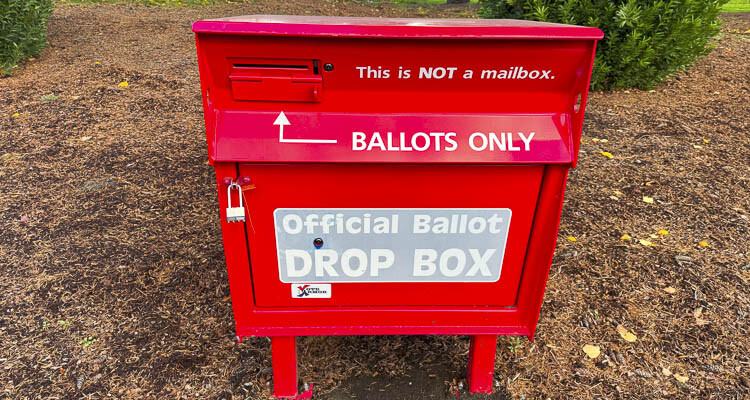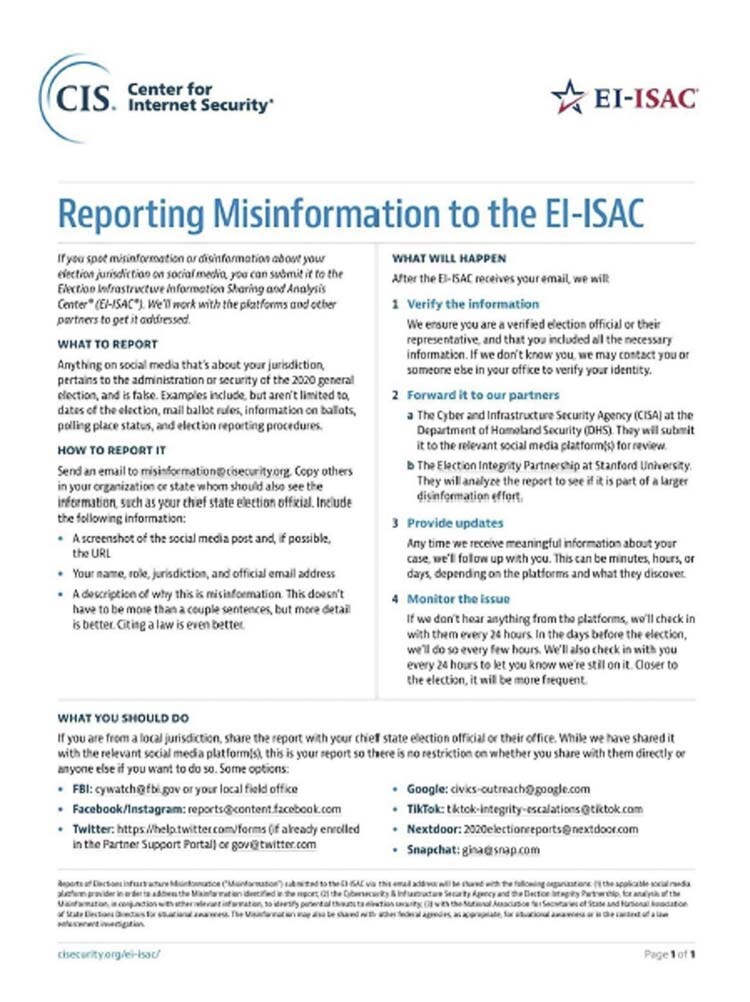
The project is a more technically advanced version of similar efforts conducted by SOS under then-Secretary of State Kim Wyman during the 2020 election cycle
TJ Martinell
The Center Square Washington
The Center Square reported that the Washington Secretary of State’s Office contracted with a U.K.-based company, Logically, to monitor social media platforms and generate reports on election or voting “misinformation.”
The project is a more technically advanced version of similar efforts conducted by SOS under then-Secretary of State Kim Wyman during the 2020 election cycle that involved collaboration with a nonprofit that, under a new law, will soon have access to all the state’s election systems.
In recent years, government agencies have sought to combat online “disinformation” posted on social media, often in ways that have proved either controversial or unconstitutional. The Foundation for Individual Rights and Expression has previously written that these public-private partnerships have the potential to create a situation where “the government may be sharing its power with ostensibly private actors to such an extent that the latter are effectively functioning as government agents.”
Last year, a Louisiana judge issued a ruling prohibiting federal agencies from contacting social media platforms over First Amendment-protected speech. A separate case filed by the Missouri Attorney General’s Office against the Biden administration is set to be heard by the U.S. Supreme Court regarding efforts by the administration to coerce social media platforms to remove undesired content regarding various topics, including voting and the 2020 election.
For public officials like Washington Secretary of State Steve Hobbs, government tracking disinformation is vital to maintain voter confidence in the democratic process. Last year, he said at an AARP “telephone town hall” that “if these election lies…just start growing and growing without countering it or knowing what really happens with our elections it creates doubt in our election process. We have malignant actors outside the United States … who create these fake posts to create disruptions.”
During the 2020 election, several SOS staff were tasked with monitoring social media for posts with potential “misinformation” or “disinformation” regarding the state’s election system. This is according to documents and emails obtained by The Center Square. The responses by SOS varied. In some cases, the posts were used to craft voter education messaging intended to counter false statements that could undermine voter participation or undermine confidence in the election system. For example, one post claimed that the Voter Registration Database has not been updated in 18 months, whereas according to SOS, it gets updated every month.
Wyman told The Center Square that “we wanted to be able to have timely responses to what people were saying online.”
However, posts were also reviewed and later reported to the Center for Internet Security, a New York State-based nonprofit that manages a network-based intrusion detection system known as “Albert sensors,” which all counties will be required to use under a bill recently enacted by the Legislature. CIS also coordinates the Elections Infrastructure Information Sharing & Analysis Center.
The criteria for reporting wasn’t set in stone. One SOS staffer asked a colleague “do we report humor that misleads asked whether,” to which their colleague responded “when in doubt, report it!”
Wyman told The Center Square that there wasn’t a formal process for determining what constituted election disinformation to be reported, but that they consulted with their attorneys to make “sure the work we were going to do was going to be constitutional and not be violating anybody’s privacy rights.”
She added that they did not request social media platforms delete or remove posts unless they contained false information about the “time, manner, and place of election.” The others were left for the platforms to determine if they had violated the terms of service. At the time, platforms like Twitter, now known as X, stated it would remove or label tweets that contained “false or misleading information intended to undermine public confidence in an election or other civic process,” including:
- False or misleading information that causes confusion about the laws and regulations of a civic process, or officials and institutions executing those civic processes.
- Disputed claims that could undermine faith in the process itself, e.g. unverified information about election rigging, ballot tampering, vote tallying, or certification of election results.
- Misleading claims about the results or outcome of a civic process which calls for or could lead to interference with the implementation of the results of the process, e.g. claiming victory before election results have been certified, inciting unlawful conduct to prevent a peaceful transfer of power or orderly succession.
“It’s such a tricky area,” Wyman said. “2020 was uncharted territory…for government. On one hand we have an obligation to make sure voters have the correct information, but we also need to make sure we’re not violating anyone’s privacy or anyone’s constitutional right to free speech. It was really trying to walk in that space.”
She added, “We were building the plane as we were flying it, and responding to information that was designed often times by our foreign adversary to undermine people’s confidence in our elections.”
According to a document titled “Reporting Misinformation to the EI-ISAC,” government officials collaborating with CIS were to report “anything on social media that’s about your jurisdiction, pertains to the administration or security of the 2020 general election, and is false.”
The document also suggested government officials report election “disinformation” to the FBI and that all reports sent to EI-ISAC by government entities would be forwarded to the following:
- The Cybersecurity & Infrastructure Security Agency and the Election Integrity Partnership, for analysis of the Misinformation “to identify potential threats to election security.”
- The National Association for Secretaries of State
- The National Association of State Elections Directors for situational awareness.
“The Misinformation may also be shared with other federal agencies, as appropriate, for situational awareness or in the context of a law enforcement investigation,” the document states.
Wyman resigned as SOS in 2021 to work as the senior election security advisor at CISA, and now works as a senior fellow at the D.C.-based Bipartisan Policy Center.
Not every social media post flagged for review by SOS staff was reported to CIS. Among them was a tweet by former Washington State Republican Party Chair Susan Hutchinson deemed “accusatory,” which read: “For us who remember WA in 2004 this @SpeakerPelosi statement is chilling. Dino Rossi-R won the Gov race AND recount. Done. But the union bosses stepped in. They paid for hand recount and “found” ballots. Rossi ‘lost’ by 129 votes. WA state has never been the same.”
However, SOS did report to CIS another Twitter account that posed the following: “Washington State in 2004 judges ignored the real count and rewarded the Democrats.”
When The Center Square reached out to Hutchinson for comment on SOS flagging her tweet for review and potential reporting, she said “all I can say is ‘unbelievable.’ [There is] absolutely nothing wrong in what I said. Maybe the only opinion [in that tweet] is that Washington state has never been the same, but you could basically say that’s true. We used to have Republicans elected at every level of government, and everything changed after that. In a way that’s also a true statement.”
She added that “what social media is, is opinion, it’s full of opinions. It’s why people follow it. I think we’re getting to the point where we see this so much it’s a grave concern in a democracy.”
Another tweet reported by SOS and later removed stated, “I disagree that we deserve any of this: these WA Democrats have been cheating w/mail in voter fraud for decades. Did you see the Nov. 2019 election? It was a joke. They didn’t even try to hide it. I just wonder: will they try & cheat next week with the entire country watching?”
One SOS staffer reported a tweet to CIS that told conservatives to vote in person and not by mail, because “it’s not clear if this tweet is a simple statement or recommendation to ‘conservatives,’ or if this is a directive. If it’s the latter, that would not be true. In Washington state, voters may return their ballots by mail, by placing their ballot in an official ballot drop box, or by visiting a county voting center.”
Another SOS email says a tweet should be reported to CIS because “even though we corrected him, he’s still spreading misinfo/opinion.”
While CISA remains embroiled in a legal fight over alleged civil rights violations, Wyman said during her stint at CISA that “if we wanted to make an informational one page sheet for election officials … we had to run it through our attorneys for a content check making sure we weren’t getting sideways. I think that that really raised my awareness in a much more focused way. We have to always make sure as government…that every American has a right that is protected by the constitution to say what they want to.”
She added that “if I could change anything about what we did in 2020 is probably taken the time to be more formal in how we’re doing that work. I think after going through my time at CISA and that experience … government has to be very careful in this area.”
This report was first published by The Center Square Washington.
Also read:
- Secretary of State investigation underscores lack of citizenship verification to voteA Secretary of State investigation reveals gaps in citizenship verification for voter registration in Washington.
- Vancouver Police investigate fatality collisionVancouver Police investigate a fatal pedestrian collision at NE Fourth Plain Blvd.
- County seeks volunteers for Development and Engineering Advisory BoardClark County seeks volunteers for DEAB to assist with policy and code review.
- Facing $10B in budget overspending, Washington considers $1.4B state worker pay hikeWashington faces a $10B budget shortfall, considering a $4B worker pay hike.
- 15-year-old earns Eagle Scout after repairing abandoned playgroundTeen Preston Aarhus earns Eagle Scout after revitalizing Vancouver playground.
- POLL: How would you rate the accessibility of Vancouver city officials for addressing community concerns?How accessible are Vancouver city officials to community concerns?
- Budget leader says funding for programs and services is safe, concern is demand for billions in new spendingSen. Lynda Wilson highlights safe funding for services despite looming demands for billions in new spending.












